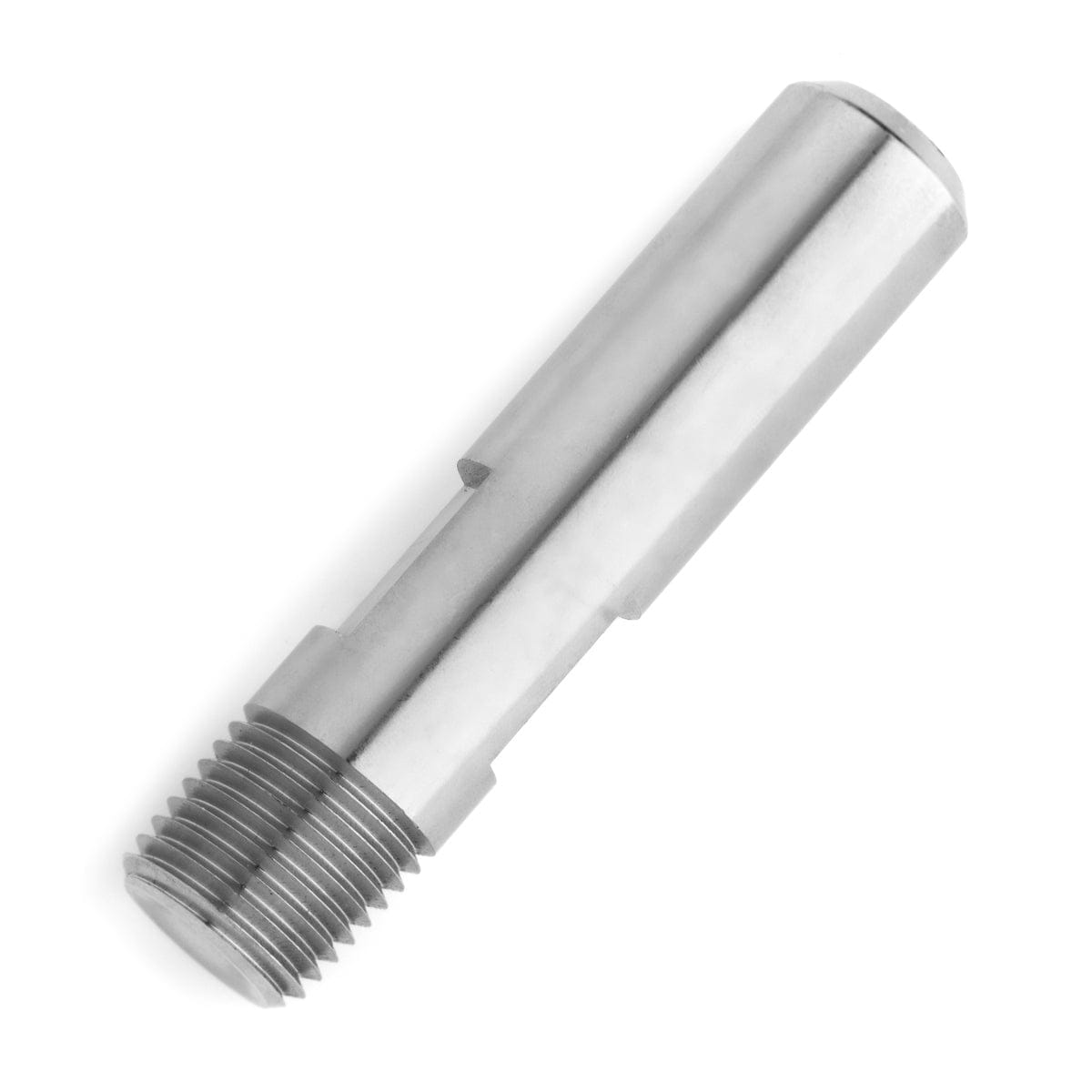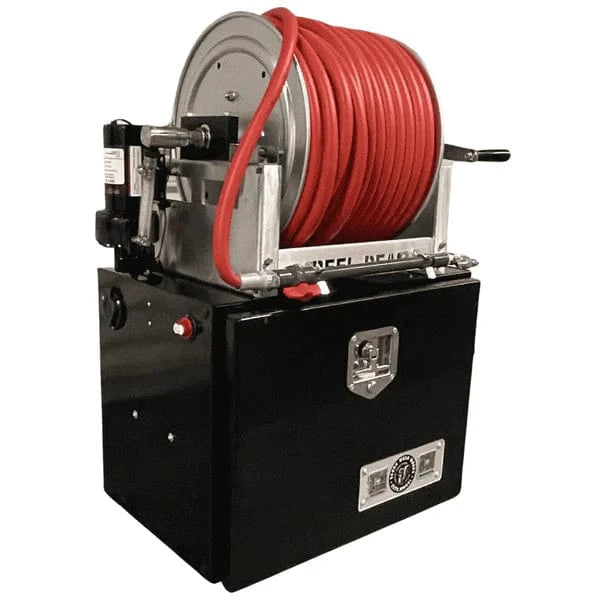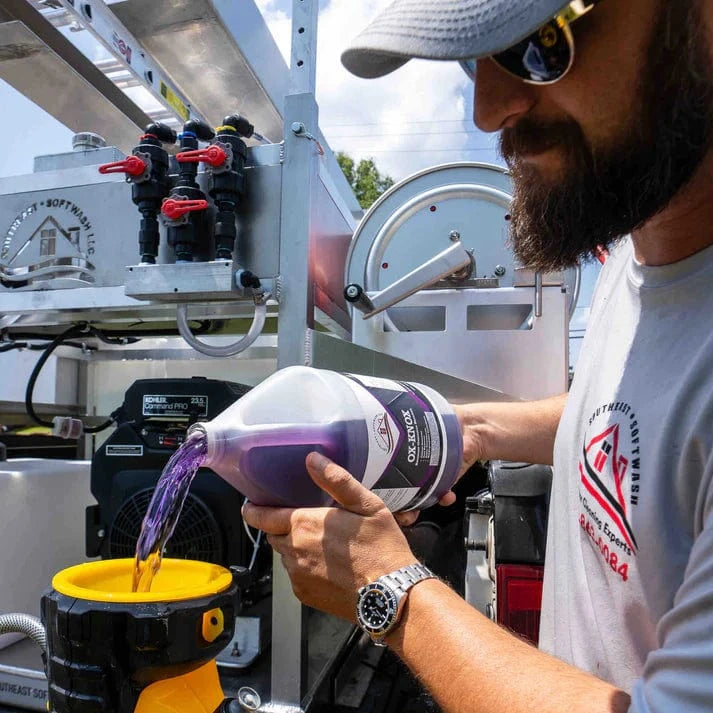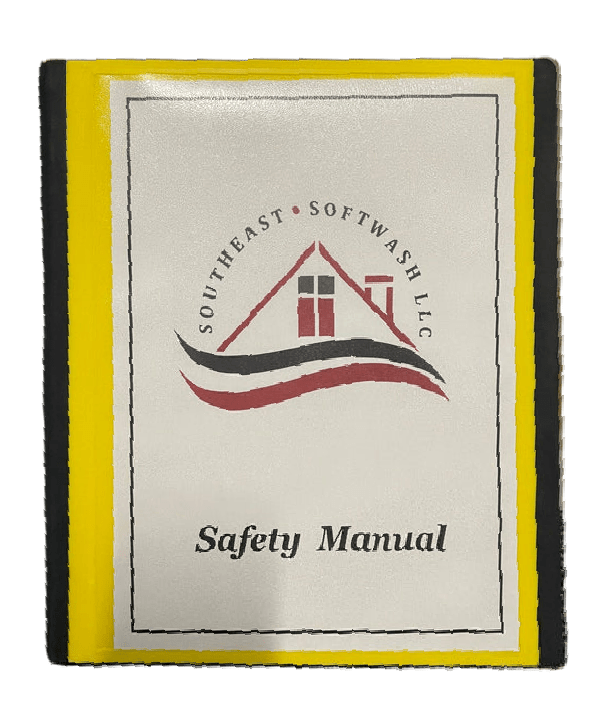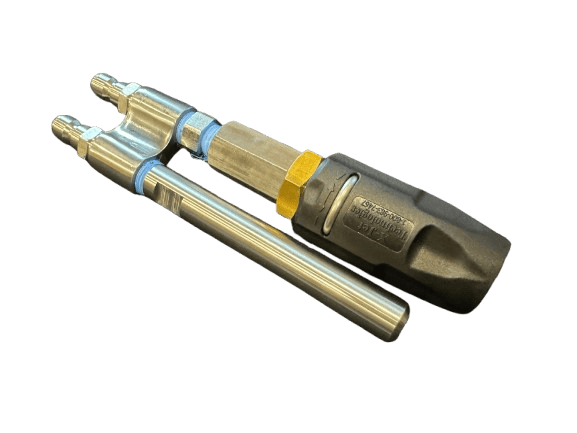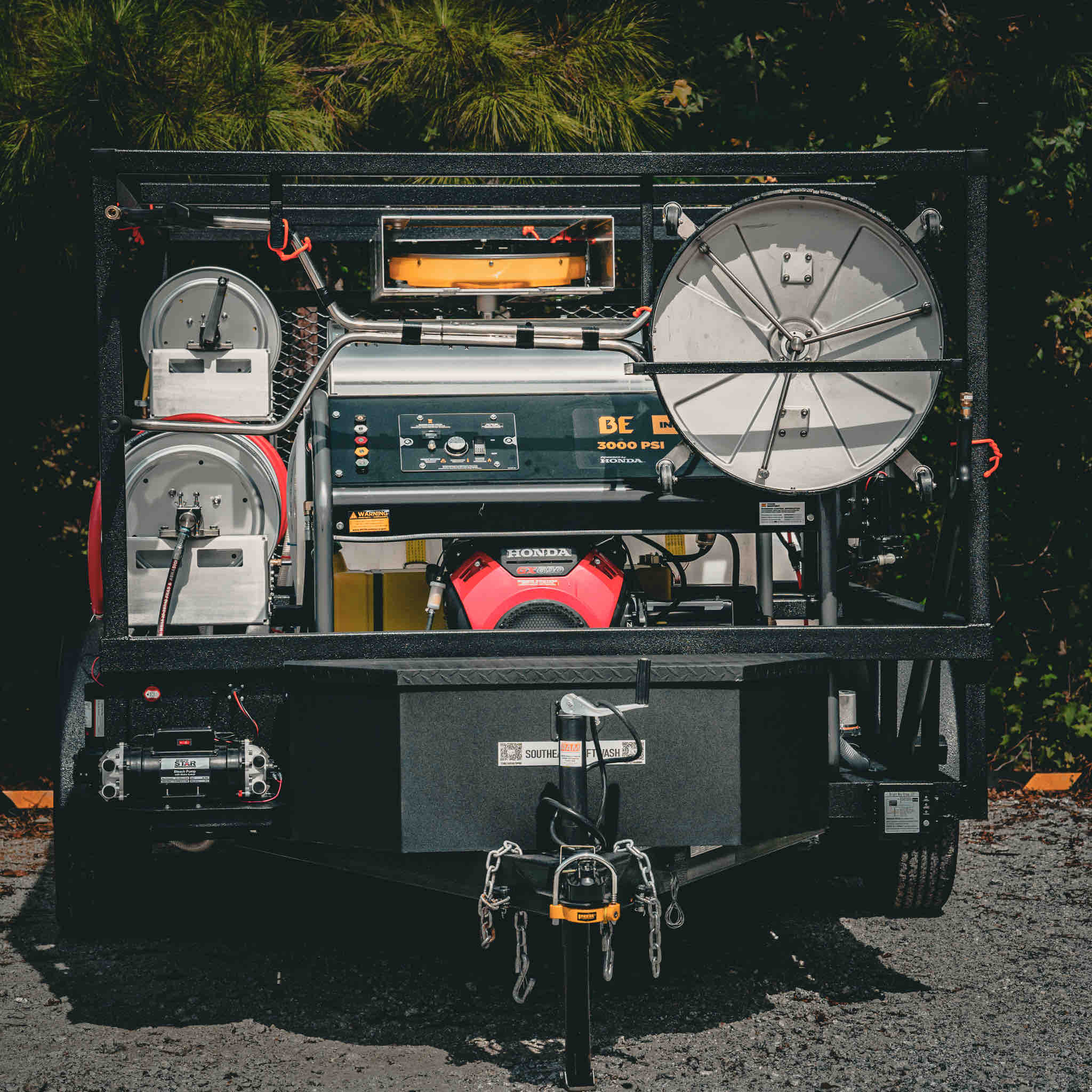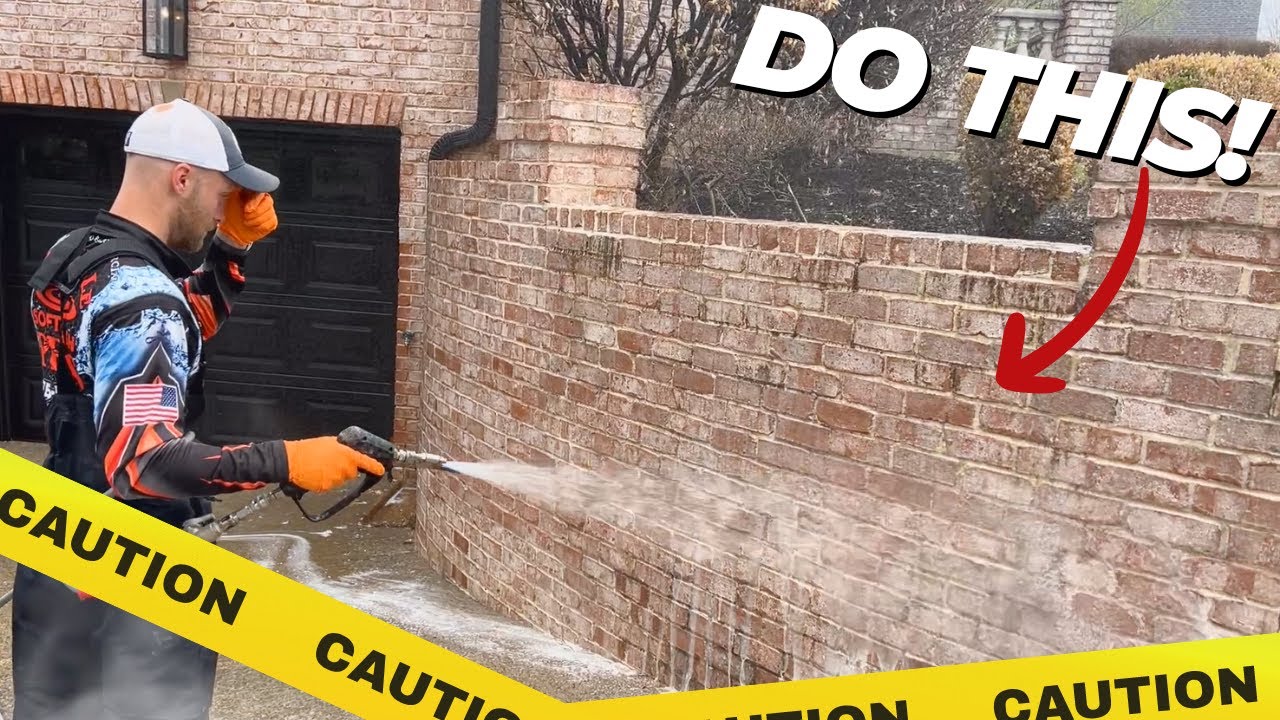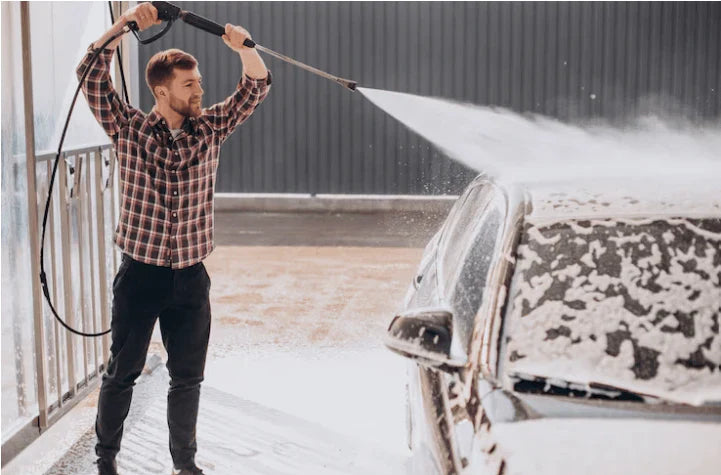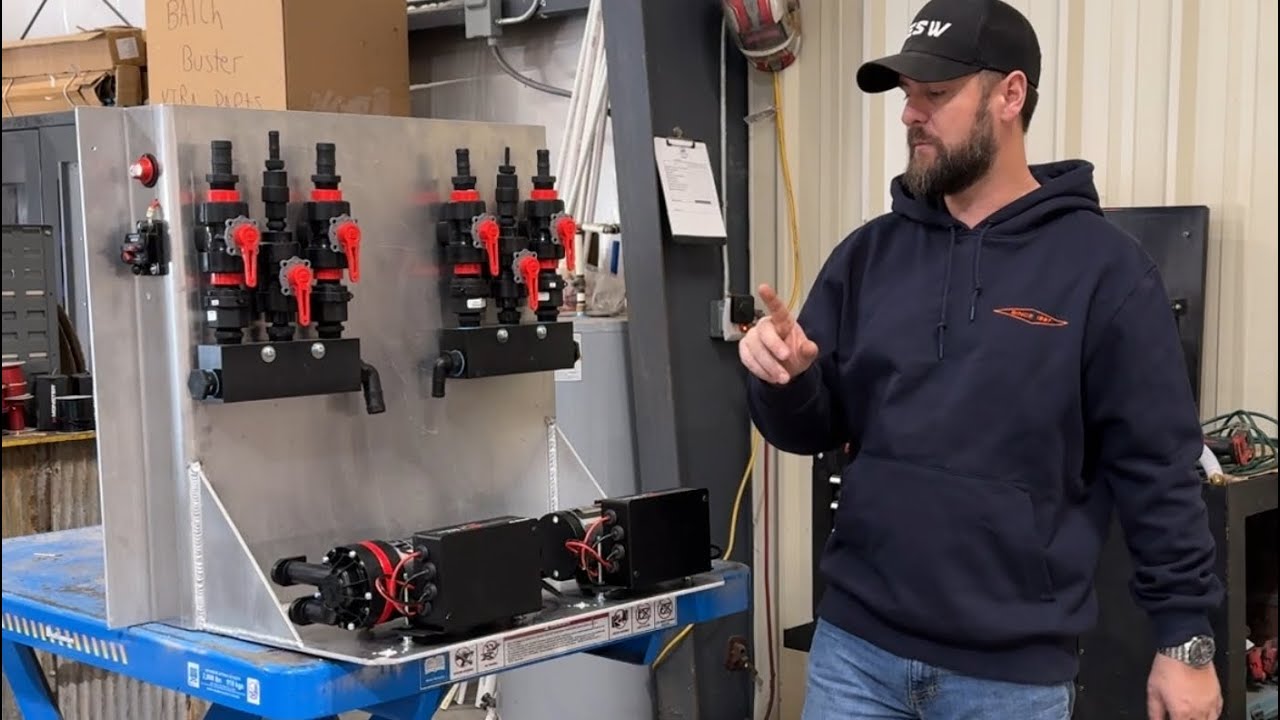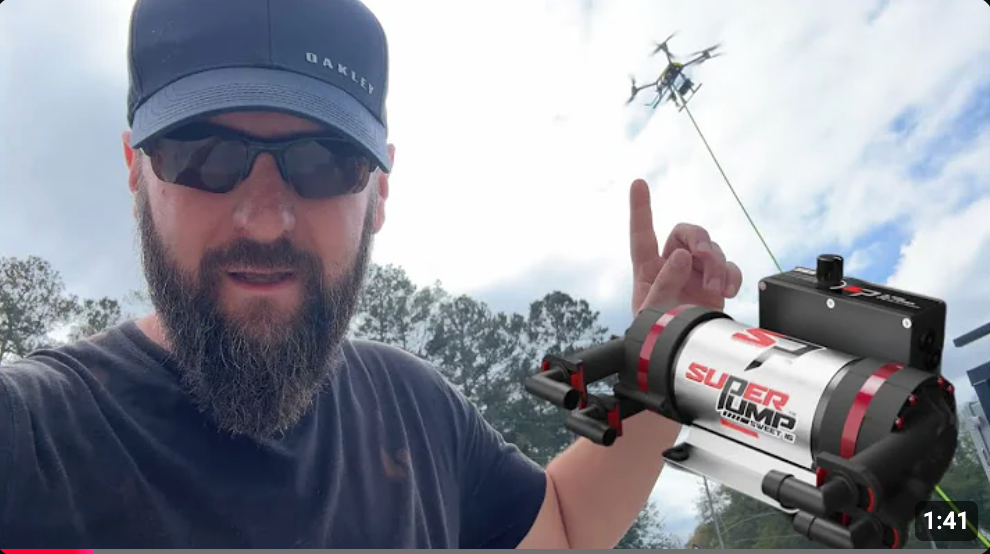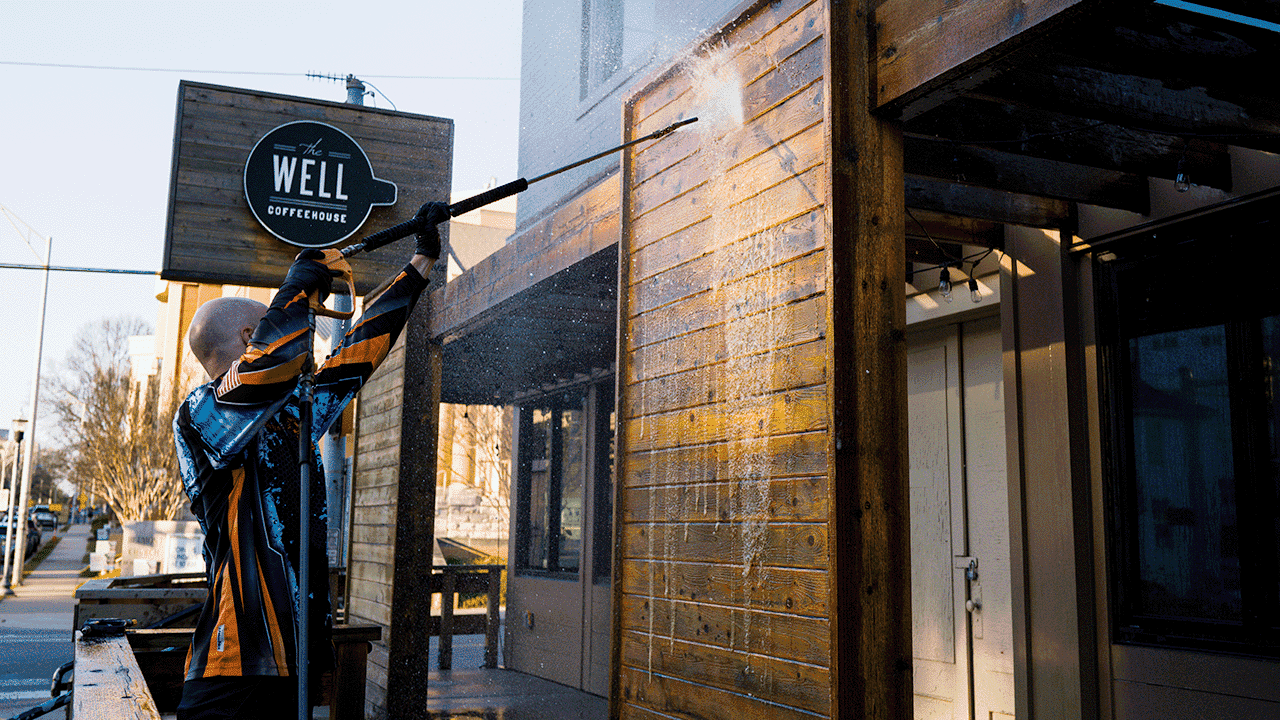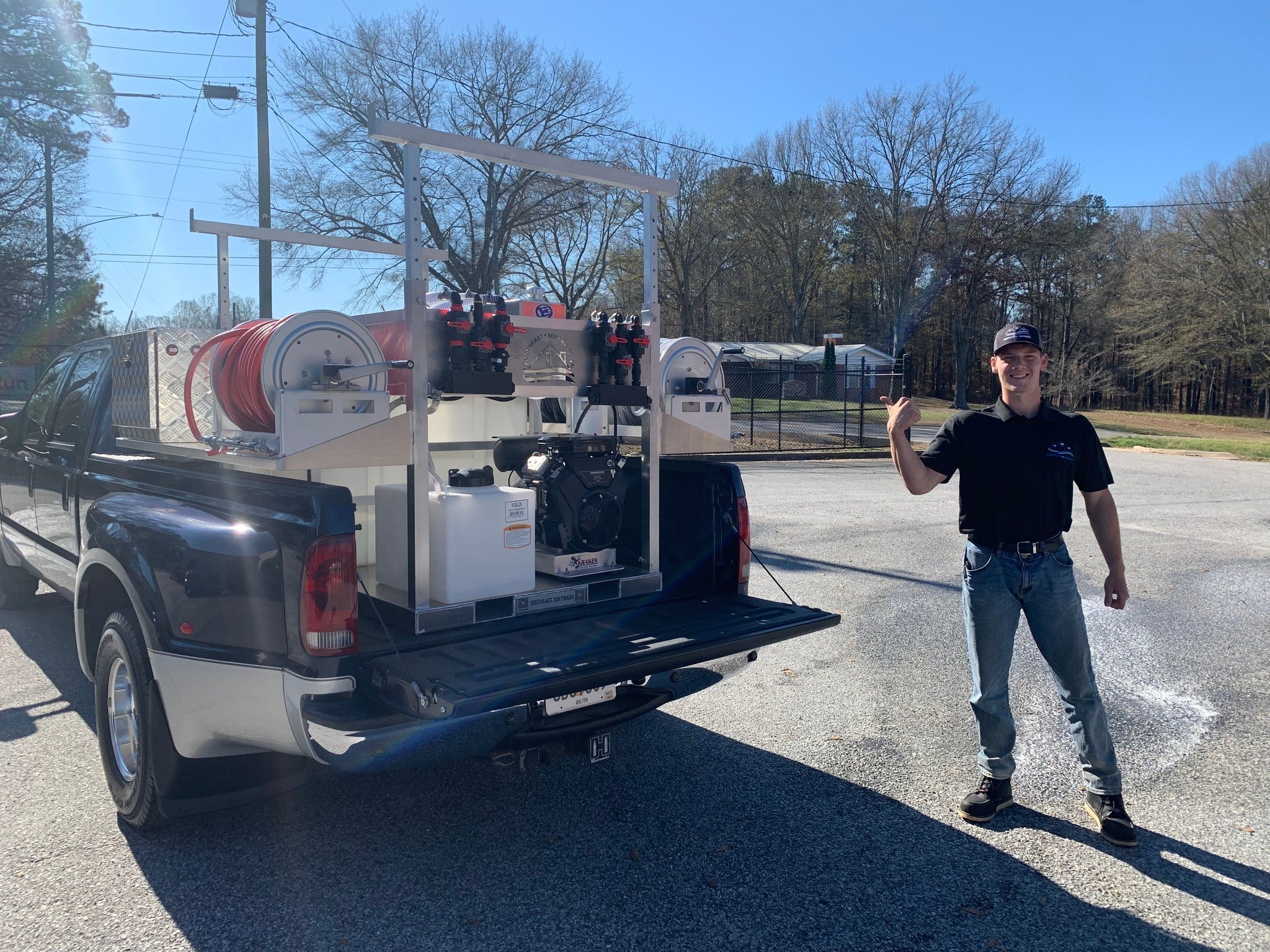Hey there, fellow pressure washing colleagues! If you're in the game of making dirty surfaces clean and bringing back that fresh, new look, then you probably know that a reliable soft wash system is a crucial tool in your arsenal. But how do you choose a soft wash system for your business?
In this blog post, as softwash experts we're going to dive into the world of soft wash systems and explore how to choose the right one for your pressure washing business.
- Why Choose soft washing for your business
- Choosing the right soft wash business
- Essential soft wash accessories
- Maintenance and care
- Marketing your soft wash service
- Growing your soft wash business
Let’s dive right into the details...
What is Soft Washing?
Let's start at the beginning. What is soft washing, and why is it a game-changer for your pressure washing business?
For the most part, soft washing is the gentle giant of the pressure washing world. it’s perfect for delicate surfaces and even some not-so-delicate ones.
Unlike its cousin pressure washing, soft washing is a cleaning method that uses a low-pressure spray system to apply a biodegradable, environmentally friendly chemical solution to treat and clean surfaces.
It's particularly effective for cleaning delicate surfaces like shingles, stucco, and wood siding.
So, unlike traditional high-pressure power washing, soft washing relies on the chemical's cleaning power more than brute force.
This makes it the ideal choice for those who want to take a more gentle approach to cleaning, preserving the integrity of the surface while getting rid of dirt, mold, mildew, and grime.
Want to know more? Check out this 101 book on how to start a pressure washing business.
“unlike traditional high-pressure power washing, soft washing relies on the chemical's cleaning power more than brute force.”
Why Choose Soft Washing for Your Business?
So, why should you consider adding soft washing to your pressure washing business in the first place?
Let's break it down:
Versatility: Soft washing is not just for soft surfaces. You can use it on a wide range of materials, from vinyl to concrete, and everything in between. This versatility can open up new revenue streams for your business.
Gentle Cleaning: Soft washing minimizes the risk of damaging surfaces compared to high-pressure washing. It's safer for those fragile, easily damaged surfaces you might come across.
Eco-Friendly: Many soft wash systems use environmentally friendly cleaning solutions, making it a more sustainable option for you and your customers.
Regulatory Compliance: In many places, there are strict regulations on runoff from power washing.
Soft washing produces less runoff, making it a good choice for businesses operating in areas with environmental regulations.
Professional Image: Offering soft washing services can set you apart from competitors who only offer traditional power washing.
It shows that you're up-to-date with the latest industry trends.
Choosing the Right Soft Wash System
Now that you know why soft washing is a fantastic addition to your pressure washing business, it's time to dive into the nitty-gritty of choosing the right system.
Here are some essential factors to consider:
Soft wash systems come in various types, each with its own set of advantages and disadvantages. Here's a list and brief description of some common types of soft wash systems:
Pump-Up Sprayers
- Pros: Pump-up sprayers are affordable and portable. They are easy to use and maintain, making them an excellent choice for small-scale or residential projects.
- Cons: These systems have limited capacity, which usually isn’t suitable for medium to large jobs. They require manual pumping, which can be tiring, and are mostly used for occasional home use. I wouldn’t normally recommend these for professional use.
Battery-Powered Sprayers
- Pros: Battery-powered sprayers offer increased mobility compared to manual pump-up sprayers. They provide consistent pressure, making them a more reliable choice for various jobs.
-
Cons: Their capacity is still limited, and the battery may require recharging or replacement over time.
Trailer-Mounted Systems
- Pros: Trailer-mounted soft wash systems are suitable for larger, commercial projects. They offer high capacity and the convenience of mobility between job sites. These systems are often equipped with pumps that can handle a range of cleaning chemicals.
- Cons: They are less portable compared to smaller units, and the initial investment can be substantial. You need a trailer or vehicle to transport the system.
Skid-Mounted Systems
- Pros: Skid-mounted systems are similar to trailer-mounted systems but are more compact and easier to mount on smaller trucks or vans. They offer the capacity and capability needed for commercial jobs while maintaining some level of mobility.
- Cons: Like trailer-mounted systems, skid-mounted systems can be relatively expensive. They may not be as portable as smaller options.
Custom-Built Systems
- Pros: Custom-built systems allow you to tailor your soft wash setup to your exact needs. You can choose the capacity, components, and features that match your business requirements.
- Cons: Custom-built systems can be costly and may require expert knowledge to design and assemble. Maintenance and repairs might also be more complicated.
DIY Systems
- Pros: DIY soft wash systems are a budget-friendly option. They allow you to build a system using readily available components.
- Cons: Building a DIY system requires technical expertise, and it may lack some of the features and safety measures present in commercial systems. There may be compatibility and reliability issues.
Incidentally, I have an entire course on how to build a soft wash system so be sure to check it out.
Most of these soft wash systems have their place in the industry, and the choice depends on the scale of your business, the types of projects you handle, your budget, and your level of technical expertise.
My general advice is that smaller, more portable systems are suitable for residential or small-scale projects, while trailer-mounted and skid-mounted systems are better equipped for commercial applications. Custom-built systems offer flexibility but they do require a more substantial investment.
When selecting a soft wash system, consider what you want it to do and also think about the potential for growth in the future.
Here are some of the more specific factors that will matter for your jobs...
Pressure and Flow Rate
The pressure and flow rate of your soft wash system are critical factors. Soft washing typically operates at a pressure of around 40-60 PSI, which is significantly lower than traditional power washing.
The flow rate should be sufficient to deliver your chosen chemical solution effectively. Make sure the system you select can deliver the necessary pressure and flow rate for your needs.
Chemical Compatibility
The heart of any soft wash system is the chemical solution it uses.
Make sure that the system you choose can handle the cleaning solutions you plan to use.
Different chemicals have different viscosity and corrosiveness levels, so compatibility is crucial. And check out the chemicals I use so you can nail every job easily.
Tank Capacity
The tank capacity of your soft wash system will determine how long you can work before refilling. Consider the typical size of the jobs you handle and choose a system with an appropriate tank capacity to minimize downtime.
Portability
If your business involves a lot of traveling between job sites, portability is a must. Look for a soft wash system that is easy to transport and set up. Smaller systems like battery-powered sprayers or skid-mounted units may be better suited for businesses with a lot of on-the-go work.
Durability
Invest in a soft wash system built to withstand the rigors of your business. Look for durable materials and a reliable pump. A well-constructed system will save you money and headaches in the long run.
Budget
Let's talk about the elephant in the room - your budget. Soft wash systems come in a range of price points. While it's essential to stay within your budget, remember that quality often comes with a higher price tag. Investing in a reliable system may pay off in the long run with fewer maintenance issues and better performance.
Brand and Warranty
Do your homework. Research different brands and read reviews from fellow pressure washing pros.
Look for warranties that cover the essential components of the system, such as the pump, hoses, and nozzles. A good warranty can provide peace of mind.
Local Regulations
Before finalizing your purchase, check if there are any local regulations or restrictions on the use of soft wash systems and chemicals. Compliance with environmental and safety regulations is crucial for your business's longevity.
Now let’s go on to what else you’re going to need alongside your soft wash system.
Essential Soft Wash Accessories
While the soft wash system itself is the heart of what you do, there are some essential accessories that will help you maximize its performance and efficiency.
Here are some must-have items:
- Nozzles: Different nozzles provide different spray patterns and coverage. Invest in a variety of nozzles to handle various surfaces effectively.
- Hoses: Quality hoses are essential for transporting the cleaning solution from the tank to the spray gun. Ensure that your hoses are chemical-resistant and durable.
- Chemicals: Choose the right cleaning chemicals for the job. Different surfaces and types of dirt may require specific solutions. It's crucial to follow the manufacturer's recommendations for chemical dilution and application.
- Safety Gear: Your safety should always be a top priority. Invest in personal protective equipment (PPE) such as gloves, eye protection, and respiratory protection when working with chemicals.
- Surface Cleaners: To save time on large flat surfaces like driveways and sidewalks, consider using surface cleaners. They attach to the spray gun and provide even and consistent coverage.
- Extension Wands: For reaching high or hard-to-access areas, extension wands are a game-changer. They can save you from using ladders or scaffolding and make your work safer and more efficient.
- Reels and Hose Management: Proper hose management can make your job smoother. Consider investing in hose reels or other hose management solutions to keep everything organized.
Now we’ll touch on the all-important area of maintaining your equipment and looking after it properly.
Maintenance and Care
Your soft wash system is an investment in your business, and like any investment, it requires regular maintenance and care to ensure it operates at peak performance.
Regular Inspections
To keep your soft wash system in good working order, conduct regular inspections. Check for any visible wear and tear on hoses, nozzles, and other components. Address any issues as soon as you can to prevent more significant problems down the line.
Cleaning and Flushing
After each job, thoroughly clean and flush the system. This helps prevent chemical residue buildup, clogs, and corrosion. Always follow the manufacturer's recommendations for cleaning procedures.
Replace Worn Components
Don't wait until a hose bursts or a pump fails during a job!
Replace worn or damaged components promptly to avoid costly downtime.
Chemical Storage
Properly store your chemicals in a cool, dry place, following the manufacturer's recommendations.
Make sure that they are securely sealed and labeled. This not only preserves the chemicals but also prevents potential hazards.
Winterizing
If you live in an area with cold winters, it's essential to winterize your soft wash system.
This involves properly draining the system and protecting it from freezing temperatures, which can cause significant damage.
Professional Maintenance
For more extensive maintenance and repairs, it's often best to consult with professionals who specialize in soft wash systems.
Regular servicing can help extend the life of your equipment and maintain its performance.
The minimum requirements for a soft wash system in your pressure washing business will depend on the scale and types of projects you intend to handle, but here are the essential components and considerations to get you started:
Hints and Tips on Choosing a Soft Wash System
Choosing the right soft wash system for your pressure washing business is a crucial decision that can significantly impact your efficiency and the quality of service you provide. To help you make an informed choice, here are some essential hints and tips:
Understand Your Needs
Before diving into the market, assess your specific needs. What types of surfaces will you be cleaning most often? What's the typical scale of your projects? This understanding will guide your system selection.
System Type
Choose a soft wash system that suits the scale and nature of your work. For small-scale jobs, portable units like pump-up sprayers or battery-powered sprayers might be enough.
For larger projects, trailer-mounted or skid-mounted systems might be better as mentioned above.
Pressure and Flow Rate
Just make sure the system you choose can provide the right pressure and flow rate for soft washing (usually around 40-60 PSI).
Insufficient pressure can result in ineffective cleaning, while too much pressure can damage surfaces.
Chemical Compatibility
Different soft wash systems are compatible with specific cleaning solutions.
Make sure that the system you select can handle the chemicals you plan to use without corrosion or damage.
Tank Capacity
Consider the tank capacity of the system. A larger tank allows you to work longer without frequent refills, which can be pretty important for larger projects.
Portability
If your business involves a lot of mobility between job sites, prioritize portability. Smaller units like our skid-mounted systems or battery-powered sprayers are more mobile and easier to set up quickly.
Durability:
Invest in a system made from high-quality materials. Durability is key for minimizing maintenance and repair costs and ensuring a longer lifespan for your equipment.
Budget
While staying within your budget is important, don't compromise on quality. A reliable soft wash system may cost more initially but can save you money and hassle in the long run.
Brand and Warranty
Research different brands and read user reviews. Look for manufacturers that offer warranties covering essential components like pumps, hoses, and nozzles.
Local Regulations
Be aware of local regulations and restrictions on the use of soft wash systems and cleaning chemicals. Compliance with environmental and safety regulations is vital.
Ease of Maintenance
Choose a system that is easy to maintain. Consider the accessibility of key components for inspection and repairs. Simple maintenance can save you time and money.
Accessories
Don't forget to invest in essential accessories like a variety of nozzles, chemical-resistant hoses, safety gear, extension wands, surface cleaners, and hose management tools to maximize the system's performance.
Regular Inspections
Conduct regular inspections to catch wear and tear early. Address any issues promptly to prevent major problems.
Cleaning and Flushing
Clean and flush the system thoroughly after each job to prevent chemical residue buildup, clogs, and corrosion.
Chemical Storage
Properly store your chemicals in a secure, cool, and dry location, following the manufacturer's recommendations.
Safety
Always prioritize safety. Invest in personal protective equipment (PPE) when working with chemicals.
Choosing the right soft wash system is a significant step in enhancing your pressure washing business. It's an investment that, when made wisely, can improve your efficiency, expand your service offerings, and set you apart in the competitive world of pressure washing.
How to Choose a Soft Wash System – Summing Up
So, as you can see, choosing the right soft wash system for your pressure washing business can be a game-changer.
Soft washing offers versatility, gentler cleaning, and environmental benefits that can set you apart from the competition.
Remember that the right accessories, and good maintenance, are key to success in this industry. As your business grows, don't forget to invest in scaling your operations and continuing to provide exceptional services to your clients.
So, whether you're just starting your soft wash journey or looking to enhance your existing pressure washing business, follow these steps to make your business shine – and your customers' properties sparkle! Get my course today and make a start.


